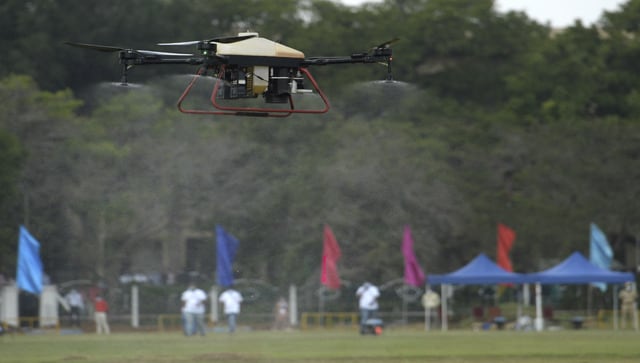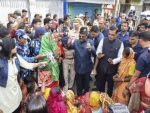‘Drone Didis’ are ready to take over the skies. Hundreds of women across India have received training as drone pilots under the NAMO Drone Didi Scheme launched by Prime Minister Narendra Modi last November.
Punjab BJP vice president Bikramjit Singh Cheema recently said that 110 women from the state have been trained to operate drones under the Centre’s women empowerment scheme. He said they will be given drone kits by the Central government on 26 January, as per a Times of India (TOI) report.
Who are these ‘Drone Didis’? Let’s take a closer look.
‘Drone Didis’
Women in rural areas have been trained to fly drones to slash time spent in spraying nano-urea on fields.
The scheme was announced following PM Modi’s Independence Day speech last year where he had declared the plan to train at least 15,000 ‘Drone Didis’ across the country, as per an Indian Express report.
The scheme aims to decrease labour costs, save time and water, as well as empower women. The initiative is a part of a broader plan to create at least two crore Lakhpati Didis (rural women earning in lakhs) in India through self-help groups (SHGs).
The training of the first batch of 300 women was conducted by Indian Farmers Fertiliser Cooperative Limited (IFFCO), the country’s largest manufacturer of chemical fertilisers, in association with Gurgaon-based training company Drone Destination.
As per Indian Express, several women, including 22 from Punjab, 20 from Haryana, 24 from Rajasthan, 29 from Maharashtra, four from Himachal Pradesh, 18 from Gujarat, 23 from Madhya Pradesh, 28 from Uttar Pradesh, two from Kerala, 10 from Bihar, three from Uttarakhand, 20 from Karnataka, nine from Assam, 11 from Telangana, 16 from Tamil Nadu, 13 from Andhra Pradesh, etc. have been trained as drone pilots.
Touching the skies
Women from varied backgrounds and educational qualifications applied to become drone pilots. They were contacted by several organisations associated with the agricultural sector at village-level, including Grant Thornton Bharat, Farmer Producers Organisation (FPO) and others, as per the Indian Express report.They were then connected to IFFCO.
Speaking to TOI, Manpreet Singh, manager for public sector consulting at Grant Thornton Bharat, said that the main aim of the programme was to “empower women and create a positive impact on their social and economic conditions by upskilling them and making them eligible for government schemes”.
The selection process involved interviews wherein the candidates were tested for basic knowledge about farming, the newspaper report added.
After selection, the women had to take theory classes before they were taught how to handle drones.
Kiranpal Kaur (34), a trained drone pilot from Punjab’s Barnala district, told Indian Express, “When we reached the training centre, I realised everything was in English, including theory classes and the notes they had provided. I am only a 10th pass, and it was almost 18 years since then that I was touching books again”.
“Before practically handling a drone, we first had to clear theory. Our trainers were extremely cooperative, and they helped us in translating the notes in Hindi and Punjabi. Once I cleared the theory exam, there was no looking back. Now, when we have returned after successful training and a certificate in hand, everyone is feeling proud that the word ‘pilot’ has been attached to my name,” she said.
“Now, the word ‘pilot’ seems like a trophy I have earned in life,” Kaur added.
Gurinder Kaur from Machhiwara in Ludhiana told TOI that her husband motivated her to join the programme. “He is innovative-minded and wants to use every new farm equipment. He has already planned things for me. Once the drone is delivered to us, he would get me a shop and hire support staff. Till now, I was busy with kids, but now that they’re in college. I am trying to learn new things. All women in the team come from the grassroots and are best-suited for the project,” she said.
The project also caught the interest of a postgraduate in microbiology. Zeenat Sharma (37) from Himachal Pradesh’s Mandi told Indian Express she did not face any issues during training. “What amazed and inspired me was the determination of rural women from Punjab for whom trainers first translated entire lectures into Hindi and then they would further translate them to Punjabi,” she said.
These women will soon be travelling in their e-vehicles across their districts and fly drones to spray fertilisers and pesticides in agricultural fields.
How much will they earn?
As per IFFCO estimates, the scheme could generate an income of at least Rs 7 lakh per annum for these drone pilots, even if they work only 200 days in a year and spray 20 acres a day. These ‘Drone Didis’ would charge farmers Rs 300 per acre or more, reported Indian Express.
IFFCO will provide drones and e-vehicles to the trained women pilots for free.
Speaking to Indian Express, Yogendra Kumar, marketing head, IFFCO, said, “The entire setup, being given for free, would otherwise cost Rs 13-14 lakh for each woman”.
A total of 2,500 drones are expected to be bought for the country in a phased manner.
With inputs from agencies
Link to article –
Who are India’s ‘Drone Didis’? The story of rural women working as drone pilots





